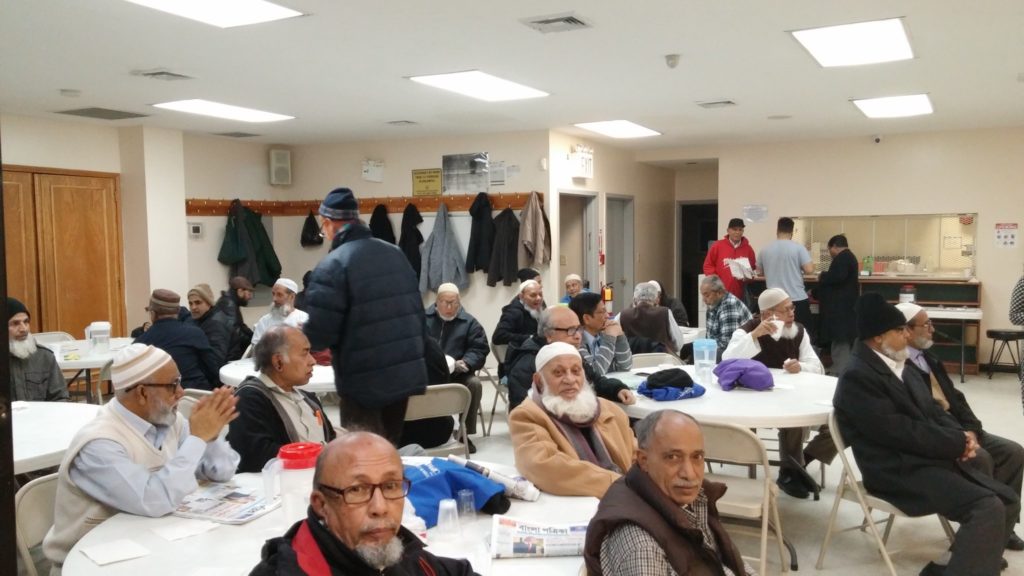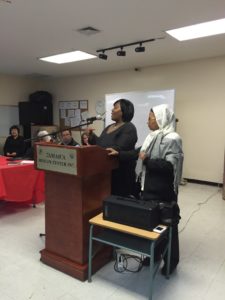I had the honor of attending a White House Initiative on Asian and Pacific Islander Americans listening session earlier this week, hosted by India Home‘s Desi Senior Center in Queens, NY. New York City is home to the largest Bangladeshi population in the United States, a community that increased in size by nearly 500% from 1990 to 2000. The 2012 US Census found that nearly 50,000 Bangladeshi people call New York City home, 74% of whom were born outside of the United States, and 53% of whom are limited English proficient. This population, like many of the populations represented and supported by the Diverse Elders Coalition, has unique needs as they age, and I was glad to hear directly from the community members about the challenges they face.

Older adults at the WHIAAPI/India Home USA listening session on January 11, 2017. Photo by Jenna McDavid.
The listening session, which was held at Jamaica Muslim Center, was attended by many representatives of federal, state, and local government, including the Administration for Community Living (ACL), the Centers for Medicare and Medicaid Services (CMS), US Customs and Immigration Services (USCIS), the US Department of Labor (USDOL), and more. For the first hour of the day, representatives made remarks that addressed general concerns of the South Asian community: for example, if someone’s workplace is unsafe, they can make a report to OSHA or the Department of Labor without fearing deportation — immigration status is not considered when reporting workplace violations. Additionally, representatives from USCIS discussed some of the waivers that are available to older adults who are taking their US citizenship test. All remarks were translated into Bengali, and both the Diverse Elders Coalition and India Home USA livetweeted the event if you want to catch up on everything that was shared.

Shyconia Burden of USCIS answers questions from listening session participants about citizenship and immigration. Photo by Meera Venugopal.
After the governmental representatives’ remarks were concluded, the floor was opened to questions from the 50+ South Asian elders who came to the event from the community. The concerns they expressed to their representatives were remarkably similar to those that the DEC collected during our recent civic engagement campaign: South Asian American older adults need assistance with transportation and accessing public services, they need healthcare that respects their traditions and meets their unique needs, they are worried about citizenship and unjust deportation of their families and communities, and they rely on social safety net programs like the ACA and Medicare to ensure that they can age with health and dignity.
More striking data on the South Asian population in New York City and in the United States can be found in Meera Venugopal’s Huffington Post article from July 2016, Are South Asians Prepared to Age in America? Meera works for India Home USA, and she told me that the Desi Senior Center in Queens serves as many as 150 elders each day, providing them with meals, cultural activities, and social connection. Many of the elders who visit the center are traveling great distances to be there — some as far away as Nassau County on Long Island.
My experience at this event reminded me of the NAPCA/WHIAAPI listening session I attended last year at the Asian Counseling and Referral Services (ACRS) in Seattle. While these populations are very different (despite the fact that they would all be lumped together under “Asian” if no disaggregated data categories were available on a given survey!), there are striking threads linking our diverse communities together, despite our unique traditions and experiences. Coalitions like ours help connect those threads and strengthen our collective voice. With so much at stake and so much to fight for in the year ahead, I’m grateful to be working with the DEC member organizations and community organizations like India Home to support diverse older adults around the country.
The opinions expressed in this article are those of the author and do not necessarily reflect those of the Diverse Elders Coalition.

